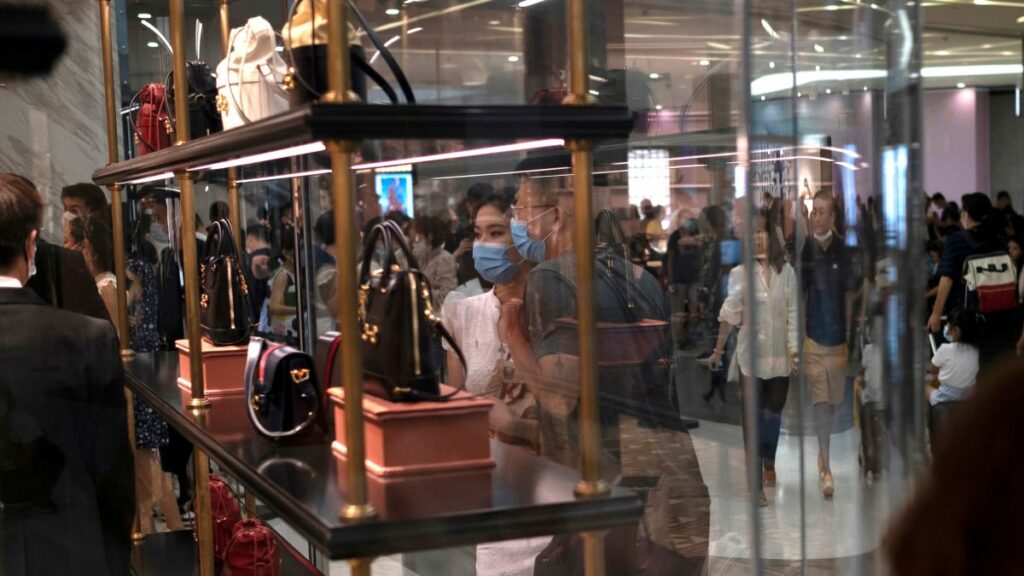President Xi Jinping’s pledge to redistribute wealth brings back bad memories for luxury brands in China

Xi’s push to redistribute wealth in the world’s second-largest economy has unsettled some luxury market investors. The sector still bears scars from a Many analysts believe the campaign could actually be good for business. While Xi’s plans are still taking shape, his government has made clear that it ultimately wants to raise the incomes of more households and expand the middle class. That, in turn, could help increase purchasing power and consumption.But experts haven’t ruled out the possibility of the government clamping down on signs of perceived extravagance or raising taxes on the rich, which could darken the outlook for makers of high-end handbags, shoes and jewelry.”Initially when it was announced, people panicked,” Zuzanna Pusz, a UBS analyst, said of the “common prosperity” pledge. “And the market panicked. Because everyone kind of went back with their memory to the anti-graft campaign, and how the luxury demand back then was impacted.”Some players have already taken a hit. Shares of LVMH slid 7.9% from August to September, while Kering, the owner of Gucci, fell 19.4% over the same period.”In the past three months, the [luxury] sector has underperformed the European market … on the back of renewed China concerns,” including the wealth redistribution campaign, a flare-up in coronavirus cases and regulation, Citi analysts wrote in an October report. The call for ‘common prosperity’Beijing has been tightening the screws on private enterprise over the past year.But the ante was upped in August, when Xi told top leaders from the ruling Chinese Communist Party that the government should establish a system to redistribute wealth in the interest of “social fairness.”According to state news agency Xinhua, Xi said that it was “necessary” to “reasonably regulate excessively high incomes, and encourage high-income people and enterprises to return more to society.” State media has suggested that the government could consider taxation or other ways of redistributing income and wealth.Some companies have taken the hint from Beijing. In recent months, several of China’s biggest tech firms have Some top executives have addressed the issue directly. Earlier this month, LVMH Chief Financial Officer Jean Jacques Guiony said that he was “not particularly worried or concerned with the recent announcement.””We don’t see any reason to believe that this could be detrimental to the upper middle class, affluent class that is the bulk of our customer base,” he told analysts. “Therefore, this seems to us not to be negative — if not positive.”Last week, Nicolas Hieronimus, CEO of L’Oreal, which owns brands such as Giorgio Armani Beauty and Lancôme, also weighed in.”We remain very confident for China,” he said on a corporate sales call, adding that the “common prosperity” pledge would likely help make the country’s middle class “wealthier and bigger, [which] is very positive for us.”A sensitive subjectIndustry observers, though, have good reason to worry. Less than a decade ago, the luxury industry was hit hard by a massive During the 2012 anti-corruption crusade, swanky hotels suffered, too, as officials called off banquets and conferences. Some five-star hotels at the time even asked to drop down a star, in hopes that the lower ratings would allow them to appear less opulent and retain business, Chinese state media Some consumers may already be starting to hold back on spending, however. According to LookLook, a consumer research firm that works with luxury brands, 1 in 10 respondents to a recent survey of 100 luxury buyers in China cited the government crackdown on excessive shows of wealth as a reason they were not spending as much these days.One participant of the study, which was released in September, cited a desire to not “attract unwanted attention,” according to LookLook CEO Malinda Sanna. “We’ve never heard that before,” she said. “I think the demand is definitely still there, but they’re being cautious.”— Laura He contributed to this report.







